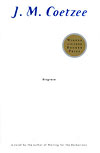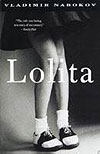
The Gashlycrumb Tinies
By Edward Gorey
I grew up with a taste for black comedy, in part because my father had a dark sense of humor. Gorey's drawings are so detailed, and the crazy, Victorian-era, gothic-y worlds he created are fascinating. This is ostensibly an alphabet instruction book, part of the three-volume Vinegar Works, but in Gorey's world, "A is for Amy who fell down the stairs." Gorey was amazing; he rarely repeated himself, publishing his books in completely different formats, like a one-inch-square book, a pop-up book, a series of postcards that came in an envelope. His imagination seems endless to me.
By Edward Gorey
I grew up with a taste for black comedy, in part because my father had a dark sense of humor. Gorey's drawings are so detailed, and the crazy, Victorian-era, gothic-y worlds he created are fascinating. This is ostensibly an alphabet instruction book, part of the three-volume Vinegar Works, but in Gorey's world, "A is for Amy who fell down the stairs." Gorey was amazing; he rarely repeated himself, publishing his books in completely different formats, like a one-inch-square book, a pop-up book, a series of postcards that came in an envelope. His imagination seems endless to me.

Duino Elegies
By Rainer Maria Rilke
When I discovered Rilke, I was 20—that tender age when the combination of romanticism and spirituality and philosophy is so appealing. I thought, Oh God, yes. Finally, here it is. I always remember the end of the first elegy. I don't mean this in any morbid way, but at that time, my boyfriend's roommate was murdered; he was the first person I knew who had died. I read the last line of that elegy, "where an almost / godlike youth / had suddenly stopped existing / made emptiness vibrate / in ways / that thrill us / comfort us / help us now?" and it struck a chord.
By Rainer Maria Rilke
When I discovered Rilke, I was 20—that tender age when the combination of romanticism and spirituality and philosophy is so appealing. I thought, Oh God, yes. Finally, here it is. I always remember the end of the first elegy. I don't mean this in any morbid way, but at that time, my boyfriend's roommate was murdered; he was the first person I knew who had died. I read the last line of that elegy, "where an almost / godlike youth / had suddenly stopped existing / made emptiness vibrate / in ways / that thrill us / comfort us / help us now?" and it struck a chord.

Jimmy Corrigan: The Smartest Kid on Earth
By Chris Ware
This was the first graphic novel I'd ever read. It's a story about a sad, left-behind guy told in real time and in flashbacks. I'm fascinated by the intricacy of the book—not just the way it's written but how the book is laid out. There are long passages where there's no dialogue. It's as if a camera is panning: The scene will start outside a house and the panels will go in and in and in, through the window, to a close-up of Jimmy. Even the book jacket folds out to this incredibly intricate page, like a treasure map.
By Chris Ware
This was the first graphic novel I'd ever read. It's a story about a sad, left-behind guy told in real time and in flashbacks. I'm fascinated by the intricacy of the book—not just the way it's written but how the book is laid out. There are long passages where there's no dialogue. It's as if a camera is panning: The scene will start outside a house and the panels will go in and in and in, through the window, to a close-up of Jimmy. Even the book jacket folds out to this incredibly intricate page, like a treasure map.

Disgrace
By J.M. Coetzee
A South African college professor has an affair with one of his students, gets caught, and as a result, moves out of the city to his adult daughter's farm. Then something terrible happens, and everything breaks down. I just tore through this—and I'm normally a slow reader. The main character's emotional and psychic journey is so well drawn. I don't usually buy multiple books by the same author, but after this perfect novel, I read a lot of Coetzee: Life & Times of Michael K, Elizabeth Costello, and Slow Man.
By J.M. Coetzee
A South African college professor has an affair with one of his students, gets caught, and as a result, moves out of the city to his adult daughter's farm. Then something terrible happens, and everything breaks down. I just tore through this—and I'm normally a slow reader. The main character's emotional and psychic journey is so well drawn. I don't usually buy multiple books by the same author, but after this perfect novel, I read a lot of Coetzee: Life & Times of Michael K, Elizabeth Costello, and Slow Man.

Lolita
By Vladimir Nabokov
I went to a good school in Oklahoma City—I wasn't a complete rube when I read Lolita in college, but I'll never forget the opening page of this book. It's the most brilliant beginning of any work of fiction I know. The subject matter—Humbert Humbert's affair with a nymphet—is still shocking, but the story pulls you in like nothing else. It's an absolute tour de force. I realize now that Lolita changed the way I've looked at every book I've read since.
By Vladimir Nabokov
I went to a good school in Oklahoma City—I wasn't a complete rube when I read Lolita in college, but I'll never forget the opening page of this book. It's the most brilliant beginning of any work of fiction I know. The subject matter—Humbert Humbert's affair with a nymphet—is still shocking, but the story pulls you in like nothing else. It's an absolute tour de force. I realize now that Lolita changed the way I've looked at every book I've read since.

The Faber Book of Letters
Edited by Felix Pryor
A friend recommended this book to me when I first moved out to California in the mid-eighties. It's a collection of letters written by prominent people between 1578 and 1939. There's something touching about these notes; the writers seem so intent on expressing themselves in an authentic way. I think, in this e-mail age, we're learning all over again the importance of being able to communicate in a clear, expressive way. Some of the examples are very funny, like the letter sent care of Sir Arthur Conan Doyle, asking, "Could you get this to Sherlock Holmes for me?" And then there are some that are historically important, like the note Dickens wrote just hours before he died. When I read that one, I just got chills.
Edited by Felix Pryor
A friend recommended this book to me when I first moved out to California in the mid-eighties. It's a collection of letters written by prominent people between 1578 and 1939. There's something touching about these notes; the writers seem so intent on expressing themselves in an authentic way. I think, in this e-mail age, we're learning all over again the importance of being able to communicate in a clear, expressive way. Some of the examples are very funny, like the letter sent care of Sir Arthur Conan Doyle, asking, "Could you get this to Sherlock Holmes for me?" And then there are some that are historically important, like the note Dickens wrote just hours before he died. When I read that one, I just got chills.




